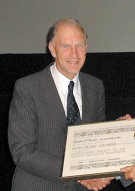We use cookies on this website. By using this site, you agree that we may store and access cookies on your device. Find out more.
Gordon Henry Bush

Gordon Henry Bush 1928-2017
Dr Gordon Henry Bush was recognised as a leading paediatric anaesthetist the world over; asked to describe him, friends and colleagues invariably begin ‘He was a real Gentleman...’
Born in 1928, he attended Clifton College before going up to Oxford (Trinity) and qualifying from St. Bartholomew’s Hospital in 1953. After house jobs he served in the RAF medical branch where he started his training in anaesthesia.
On leaving the air force he joined the postgraduate anaesthetic course in Liverpool, which had been set up by Cecil Gray. Having gained his Fellowship examination he became a Lecturer in the University Department in 1959. He undertook research into muscle relaxants, particularly the ‘dual block’ seen with repeated administration of suxamethonium, writing a thesis on aspects of block with depolarising agents for his doctorate. He produced one of the early reports of the danger of suxamethonium producing cardiac arrest in patients with burns.
From the very first, he was recognised as a superb clinician, dextrous and completely unflappable. Appointed as a Consultant at Alder Hey in 1964, he anaesthetised children for the spectrum of surgery, but he developed interests in ENT and particularly airway work. Gordon excelled at rigid bronchoscopy, and he worked seamlessly with his surgical colleagues in producing a safe and efficient service (as Harry Truman put it; it is amazing what can be achieved if you don’t mind who gets the credit!) He also continued his interest in muscle relaxant research in supporting the work of Dr. Tony Nightingale.
Away from theatres, he became involved in the care of patients on what was then a respiratory investigation unit on Ward B2. This had developed into an early form of intensive care unit, but various medical and surgical services continued the practice of ‘specialing’ patients on their general wards. The practice of concentrating the care of children who were critically ill from whatever cause in a single Intensive Care Unit grew under his stewardship as Consultant-in-Administrative- Charge from 1974, as did the practice of ‘retrieval’ of critically ill infants and children from referring hospitals.
Gordon was instrumental in the founding and development of the Association of Paediatric Anaesthetists, serving as its first Honorary Secretary for many years before becoming President (87- 89). The diplomatic skills that were evident in his organization of theatre lists came to the forefront as he succeeded both in developing the APA as a successful specialist group while maintaining such good relations with the Association of Anaesthetists that he was awarded Honorary Membership of both organisations.
Over the years, he welcomed many visitors to Alder Hey from overseas, establishing links with paediatric anaesthetists from all over the world. This was reflected both in invitations to speak at conferences from Toronto to Melbourne and in his time as President of the Federation of European Associations of Paediatric Anaesthesia. Following his retirement from Alder Hey in 1991, he was invited to be the founding editor of the ‘Paediatric Anaesthesia’, which he duly established as an internationally well- respected journal, before handing over to Edward Sumner in 1994, and quietly retiring to his duties as a grandfather. An accomplished man.
D. A. Nightingale and F. Potter


